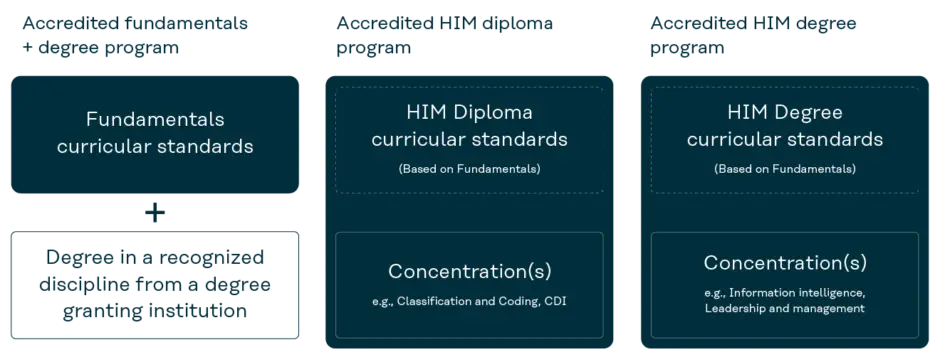Canadian College of Health Information Management introduces health information fundamentals
New curricular standards and modular framework will support curriculum development to meet industry demand
The Canadian College of Health Information Management (College) is pleased to introduce the Health Information Fundamentals Curricular Standards (fundamentals standards) that form the basis for foundational knowledge that industry requires of health information professionals.
Fundamentals standards guide Canadian educational institutions on the curriculums they develop. These standards are applicable to programs at the certificate, diploma, undergraduate degree, and graduate degree levels. They will include the following practice areas: information governance, data quality, clinical knowledge, analytics, privacy, and technology.
“The evolution of the Health Information Fundamentals Curricular Standards is rooted in broad consultations with industry and academic stakeholders,” shares Jeff Nesbitt, CEO and registrar of the Canadian College of Health Information Management and CHIMA, Canada’s health information management association. “These new standards will ensure academic programs can meet industry demand. Educators will be able to focus on teaching content that is current, relevant, and at the appropriate times, local. The College has moved away from defining specific learning outcomes; it will instead offer curriculum guidance to allow educators more flexibility.”
The Fundamentals Framework for Health Information Programs supports the pathways to becoming a Certified Health Information Management (CHIM) professional. This new, modular framework allows fundamentals standards to be embedded into many programs. There are three pillars in this framework that lead to a person to being eligible to become certified.
These are:
- Accredited diploma programs: Fundamentals standards are embedded within a health information management diploma program in conjunction with a concentration that will offer a blend of technical training. This training will dive deeper into areas such as data quality (e.g., classification and coding) and clinical knowledge.
- Accredited degree programs: Fundamentals standards are embedded within a health information management degree program in conjunction with a concentration that will offer a blend of theory and application-based training. This training will dive deeper into areas such as information governance and privacy.
- Accredited certificate program*: Fundamentals standards guide a health information certificate program. To become a CHIM professional, the certificate program must be accompanied by a degree-level program in a recognized discipline, from a degree-granting institution.
*Completion of an accredited certificate program on its own does not meet the eligibility requirements to become a CHIM professional.

“The new, modular Fundamentals Framework for Health Information Programs is a key part of the effort to modernize pathways to become a Certified Health Information Management professional and obtain the CHIM professional designation,” Jeff adds. “This certification signals to employers that professionals are credible and have a demonstrated commitment to the health information industry.”
This framework provides a modernized approach to academics and ensures professionals are able to access certification in a structured and meaningful way.
If you would like to learn more about accreditation and certification, please contact the College.
About the Canadian College of Health Information Management
The Canadian College of Health Information Management is a national, not-for-profit corporation that sets the accreditation standards for educational institutions and certification standards for health information professionals in Canada.
The College, incorporated in 1972, protects the public interest by governing and regulating the professional practice of more than 4,300 certified health information member registrants. In enhancing the status as a regulatory body, the College advances the professionalization of the health information industry and acknowledgement of its professionals as a key driver of policy, funding, and the care that Canadians receive.
Updated on 2021-10-22

